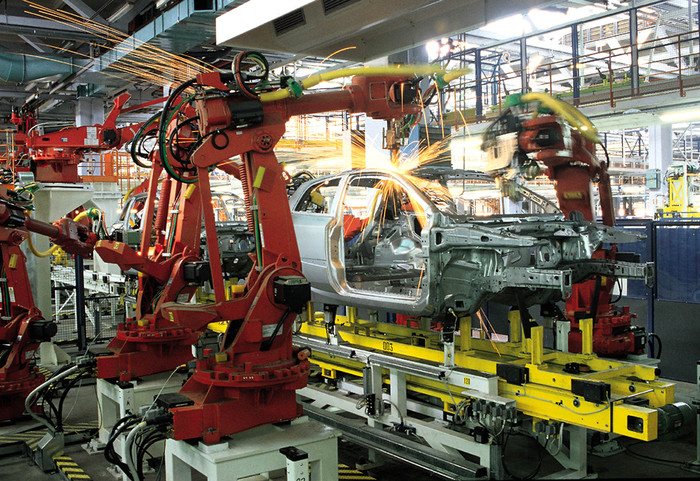Cheaper, less experienced - the juniors in high-tech. (Photo: Unsplash)
The Human Capital in High-Tech report published this week by SNPI and the Innovation Authority reflects the slowdown in the global economy, which began with the increase in interest rates in the second half of 2021 and continued with dramatic declines in the financial markets.
The global economic slowdown led to a decline in the growth rate of high-tech manpower and reached negative growth in the number of employees. The sharp transition from 2022's peak to a global slowdown has shifted the industry from a "workers' market" to an "employer's market." The significant challenge posed by the global slowdown to high-tech is also evident in data from March 2023 that reflect the industry's distress.
"This is the fifth year that SNPI has published this report together with the Innovation Authority," says Uri Gabay, CEO of SNPI Policy Institute. "We've been through difficult years, whether it's because of COVID-2022 and what follows, or last year when we saw a shift shift from the COVID-2022 crisis to the war in Ukraine and the global recession.
In the 4 report, high-tech is already in a slowdown, which is debatable whether it is acute or normal, but the peak period is undoubtedly behind us. The second half of the year was problematic, and in the last quarter we saw negative growth in the number of employees, meaning that for the first time in history, more people left high-tech than entered it. This stems from the global recession, and I remind you that this is about <>, before the local lightning bolt created by the legal coup," Gabbay says.
"In a way, it's part of the game. Israeli high-tech is part of the global economy, and when it presses the brakes, we stop here, too. This slowdown is natural, understandable and clear, what worries us is the worsening of the past <> months, which is a combination of the same global slowdown together with the uncertainty we are experiencing as citizens at the local level and greatly affects high-tech. This combination is problematic," Gabbay says.
The report's alarming findings
- A significant declinein the annual growth rate in high-tech: In 2022, the number of employees in high-tech increased by 7.4%, compared to 12% in 2021.
- Entering a slowdownin the second half of 2022: The growth rate declined steadily throughout the year. In the second half, the number of employees in high-tech grew by about 1.3 percent, a lower rate than in recent years, and declined to a negative level in the last quarter, and declined by 0.2 percent.
- Increase in layoffs, drop in resignation rate: The rate of layoffs in the second half of 2022 was 4.4% – an increase of about 70% compared to the same period in 2021 (2.6%). However, this rate is similar to the multi-year average. In addition, the voluntary departure rate of employees in the second half of 2022 was 4.7% – less than half of the voluntary departure rate in the same period in 2021, which stood at 10.1%. This rate, too, is similar to the multi-year average.
- The demand for workers was cut in half: the number of job openings in high-tech at the end of 2022 stood at about 17,32, about half of the figure for April of that year (9,<>).
- Small companies were among the main casualties: 70% of companies that employed up to 10 employees (almost all startups) maintained stability or reduced the number of employees. For these companies, which are often in a state of "growth or decline," stability and especially downsizing often signal business difficulties.
- Indications of worsening conditionsin the first quarter of 2023: 25% of companies have completely frozen hiring, a similar percentage reported continued layoffs, with a third planning to lay off more than 5% of their workforce. Unusually, about a third of companies are not planning salary updates in 2023, a rate similar to the patterns recorded in 2020 during the COVID-<> crisis.
It looks like a report that predicts blackness. Also are there bright spots?
Dror Bean (Photo: PR)
"The positive side is that in the first quarter of 2023 we are already seeing a recovery in the global economy. A few months ago, forecasts spoke of a very severe recession, and right now it looks like we'll be able to get out of it if there's an economic slowdown and we won't necessarily enter a severe recession, but it's too early to say that for sure," Gabbay says.
"The big question is whether, now that the global economy and global high-tech are starting to stabilize, Israeli high-tech will go along with them, or whether it has more weights on its legs that are undermining its stability at the local level. The answer to this question very much depends on the negotiations currently taking place at the President's House, and this is outside the scoop of the business sector, which is doing its best to keep its head above water. During such periods, they have to lay off employees. It's not pleasant for anyone but it's part of the way to cope. The fear and hope is that when the global recession ends, we will go out with it and not get stuck because of local problems."
Dror Bin, CEO of the Israel Innovation Authority: "In general, one of the strengths of the Israeli ecosystem is technology. Compared to other places in the world, where you see many more e-commerce sites that are also considered startups, Israelis are much stronger in deep technologies such as algorithms, artificial intelligence and electronics."
According to him, "You always have to look not at the specific event but at the patterns. When there is less money in the public or private market, every CEO cuts costs because he knows it will take longer to raise money. He estimates Ranvi, i.e. how long he will have to survive until the next draft, and cuts back accordingly. In such a situation, a company that develops deep technology will first cut back on shell workers so as not to harm the technological core.
And of course, when there is a decline in the economy and companies cut back on marketing and sales, then revenues, investments and exits also decline. It's a well-known cycle that always happens in times of crisis, and it's a cyclical process. When interest rates go down and the money comes back, they will re-enlarge business departments because demand will rise.
I am optimistic because I think the global hunger for technology will only grow. Existential problems such as food insecurity or the climate crisis will only intensify and require technological solutions that perhaps only Israelis can provide. We have excellent entrepreneurs and venture capital funds in Israel that know how to invest. In the medium and long term, all of this together will eventually work. The reason we're seeing a decline all over the world is because of interest rates.
One of the beautiful things about Israeli startups is diversity, both in terms of fields of activity – from cyber and fintech to health and climate – and in terms of employee demographics. Agritech and cleantech have declined less than other sectors, indicating that despite the recession, investors are pumping money in."
Indeed, there are some encouraging statistics in the report
Despite the across-the-board slowdown, the AgriFoodTech and Cleantech sectors stood out in the growth rate: all sectors were cut at the growth rate in the second half of 2022. But at the annual level, this sector ranks second in the annual growth rate for the second consecutive year.
Multinational companies remained stable, while local companies declined: multinationals showed quarterly growth rates of 1-3%. In contrast, the quarterly growth rate of domestic companies dropped from 4 percent in the first quarter to a negative figure of -0.7 percent in the fourth quarter. Multinationals also laid off fewer employees — 2 percent of all employees versus 4.9 percent at local companies — and had fewer R&D workers who left voluntarily.
Increase in the relative share of R&D workers and reduction of shell workers: A decrease in the number of employees in non-R&D positions in companies with more than 50 employees, their main employers. Indications that companies have allocated their resources to maintaining core R&D, one in three medium-sized companies and one in five large companies have laid off only employees who are not in R&D positions.But the most intriguing part of this report is actually the one that does not state the obvious.
It turns out that the economic slowdown in high-tech actually presented an opportunity for new employees to join, and many companies chose to continue the development work with less experienced employees, even at the cost of lower productivity. The share of juniors in R&D positions increased in the second half both among the general workforce and among R&D workers.
How do you explain the increase in the number of juniors?
Gabbay says: "This is one of the report's big question marks, both for employees and employers. We could have predicted the increase in the rate of layoffs and the decline in voluntary departures, but there was all sorts of speculation about juniors," Gabbay says.
"On the one hand, one would expect that when a company faces a recession, it would rather retain its good employees than experiment with inexperienced juniors. On the other hand, juniors are a cheaper labor force. We were curious to know what would happen to the juniors and found that they were actually managing to maintain their status, which is modest but the demand for it is greater than ever. This shows that the industry in Israel knows how to make budgetary adjustments, and it is also an encouraging sign for anyone who is now completing academic studies or vocational training, because it means that the effort was not in vain."
Dror Bean: "It's not surprising that when you cut back, it's convenient to take cheaper workers and give them a chance. We have not yet reached a situation of unemployment in high-tech, but there is a decline in employment, moving from place to place, this is an organization stage. At the macroeconomic level, it can even be a healthy process because resources are freed up for higher value."
Another interesting statistic is the increase in the number of Israeli employees in international companies compared to Israeli companies. How do you explain it?
Gabay: "We have seen for several years in reports that multinational companies are much more stable during recessions. When you look at the annual balance, the growth rate of local and multinational companies was the same, but when you analyze the development throughout the year, you see that multinational companies remained stable and grew by 1-3%, while local companies faced more extreme fluctuations."
"Startups in growth can suddenly jump by 20%, but they can also fall just as fast. In multinational companies, the whole spectrum of changes is much smaller. One of Israel's strengths is the mix of local and multinational companies, large and small, which makes the market versatile."
What do you think Israeli high-tech needs to beat the recession?
"A global recession is something we have nothing to do with," Gabbay says. "It comes from rising interest rates, inflation, and other external things that we have no control over. High-tech, like any other industry, has to cope. What must be done is to prepare and defend ourselves. This is what we did during the COVID-19 pandemic and it is the same today.
At the same time, this is certainly not a time to get into trouble that is under your control and could have been avoided. There is never a good time for social division, but at a time like this especially, politicians and the government should consider high-tech as a growth engine of the economy. The period is already very difficult for the industry, and they make it even more difficult because they create uncertainty and it scares away investors. Not only is investors' money dwindling, but now they are also afraid to invest it in Israel because the ground is unstable. The engines of the economy must act and move forward towards exiting the recession and increasing the number of workers, as well as integrating diverse populations from the periphery and minority groups, a strong trend that was very strong and halted in recent quarters."
Dror Bin: "As of the end of the first quarter, we did not see a significant difference between the situation in Israel and other places in the world, but the concern is that difficulties at the local level will split us from the rest of the world and it will advance without us. To this end, we are working with professional elements in the government in order to promote measures that will reduce the damage and stabilize the boat."
- Marketing & Digital
- Headers
Tags
- Labor market
- High Tech
- Work
- Personnel
- Dismissal
- growth
- recession
- Israel Innovation Authority









